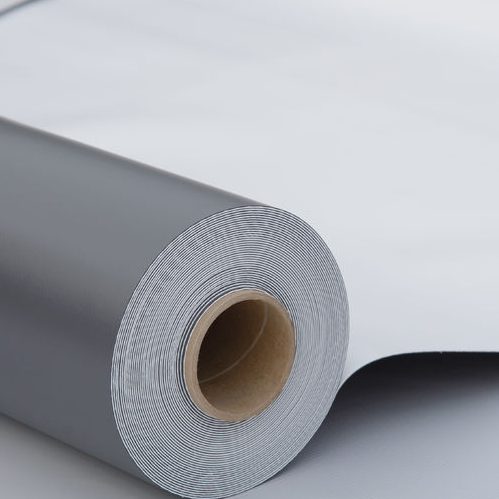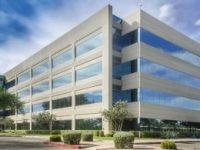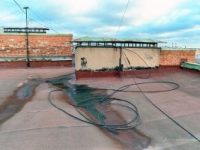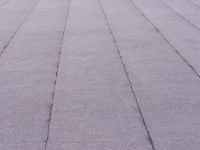Flat Roof Materials for Commercial Properties
As a commercial property owner, you want to have the best roofing for your building. Our roofs not only keep us protected against inclement weather and the outside elements, but they also ensure that we are safe and comfortable throughout all the seasons. Because of this choosing, a superior roof is of the utmost importance. If you are in the market for a new roof, you might wonder what the best roof material for a commercial building is? Typically, commercial properties have flat roofs, so you want to find a flat roof that is long-lasting, durable, energy-efficient, and affordable.
There are many roofing systems to choose from, but a flat roof system that commercial property owners select repeatedly is single-ply roofing. What is a single-ply roofing system? Single-ply roofs are prefabricated roof membranes that are installed on low-slope or flat roofs. Over the years, the roofing systems that used to reign supreme over flat roofing (modified bitumen and built-up roofing) have been pushed aside in favor of single-ply roofs. This is because single-ply roofs don’t require as much maintenance as other traditional flat roof systems. They are sturdy, long-lasting, and offer commercial roofs a lot of protection and savings.
Single-Ply Roofing Vs Built-Up
When choosing what type of flat roof material will be best for your commercial property, it’s best to go over the details of both. Single-ply roofs are roof membranes made of synthetics or rubber, which can be installed without fasteners. Built-up roofing has been a popular commercial roofing system for over 100 years. A built-up roof is constructed of layers of tar and gravel that are applied onto the roof. Now that you know what materials they are made of and how they are constructed, the next step is to go over which one would be best for your commercial roof.
Many people choose single-ply roofing because it is a lot less expensive than built-up roofing, but they are fire-resistant, reflective, and have continued to become better and better throughout the years. People who choose built-up roofs like that they are low maintenance are seamless and provide UV protection. What people don’t necessarily like about single-ply roofs is that the UV rays can ruin the roof, they are seamless, and installing around vents and other roofing can take time; in regards to built-up roofing, people don’t like that it can take a long time to install, it costs more, and there is added weight to the roof. You need to weigh the pros and the cons when determining what roof you want. If you are interested in single-ply roofing, you need professional single-ply roofing contractors to help you.
Single-Ply Roofing Pros and Cons
If you are considering single ply roofing for your commercial property, knowing what the single-ply roofing details are can help you make an informed decision. In terms of benefits, single-ply roofing is a great roofing option because there are a couple of choices to decide from. There are many insulation options to choose from, are easy to install, are reflective, and are flexible, and they are durable.
Regarding the drawbacks of a single-ply roof, they can become punctured very quickly, installing around roof vents and HVAC units can be tricky, leak at their seams, and UV rays can damage the surface of the membrane. However, it’s important to note that because there are three single-ply roofing options, they will have different benefits and disadvantages, so really get technical, you need to look at single ply roofing options to decide if single ply roofing is for you.
Single-Ply Roofing Options
There are three single ply roofing options that are the most common choices for people to choose from.
- EPDM Roofing: EPDM roofing, or ethylene propylene diene monomer, is a single-ply roofing system made of synthetic rubber. Many people ask, “Are EPDM roofs any good?” and the answer is yes. They can withstand severe weather; they are chemical resistant, offer UV protection, and are very strong and flexible. How long does an EPDM roof last? When properly taken care of, these roofs can last up to 30 years.
- PVC Roofing: Thermoplastic polyvinyl chloride, or PVC roofing, is made from ethylene and chlorine derived from natural gas and salt. The great thing about PVC roofing is that they are fire-resistant, eco-friendly, durable, chemical resistant, and able to be welded. How long do PVC roofs last? These single-ply roofs can last upwards of 20 years or more when they get the proper maintenance.
- TPO Roofing: What is single-ply TPO roofing? TPO, or thermoplastic polyolefin, is synthetic roofing that is applied directly on top of the roof. This type of single-ply roof comes in a wide range of colors, its reflective, fire-resistant, wind-resistant, can reduce cooling costs, and has many pricing options. Another great thing about this roof is that it can be installed directly over an existing roof, giving the roof more protection.
If you are interested in single ply roofing for your commercial property in Sparks, NV, call Alpine Roofing Co. today! We work with GAF material, so you will always have the best single ply roof for your business. Call us at 775.358.7663 to learn more.




